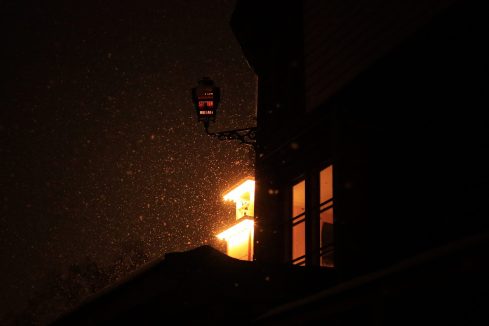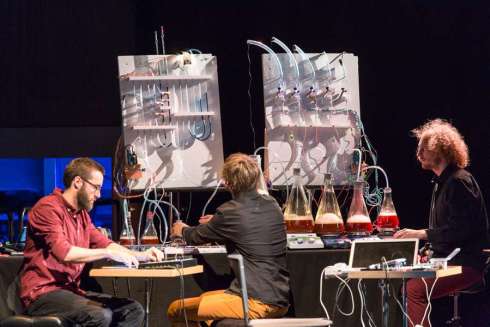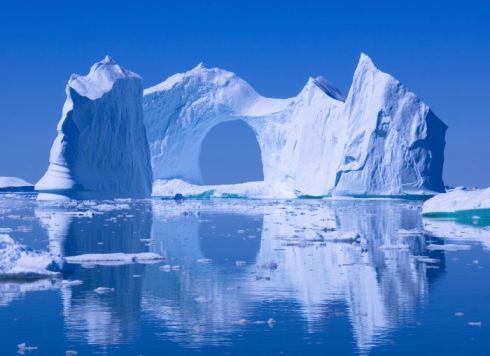Another Kammer Klang in Dalston provides a two-day weekend residency for Annea Lockwood; the New Zealand-born composer who started her career in the ferment of 1960s summer-schools at Darmstadt (with their focus on organised electronic composition) but who rapidly went far beyond that. Curated by former ‘Wire’ online editor Jennifer Lucy Allan, the weekend features various Lockwood European premieres alongside work by Chiyoko Szlavnics, EVOL, Yoshi Wada and Peter Hannan.
* * * * * * * *
For the Saturday event, Jennifer will be reading from ‘Annea Lockwood – Sound Streams’, an essay written by The Wire’s Louise Gray (for the Edition Festival for Other Music) which explores Annea’s ethos through from her early Darmstadt days to the present. En route, it touches on her playful Fluxus-influenced piano stunts, such as floating a tiny, tinkling musical box, attached to a bright childlike bunching of helium balloons, out of the body of a grand and into a the space of formal concert hall; or kitting out an old upright with integrated, foregrounded toys which not only made avant-garde noises but also visibly kept their toy nature.
The essay also delves into Annea’s later approach of mapping sound and space as a listener, mapper and translator – having ditched electronic sound-sources as master tone generators (while retaining electronics for processing), she moved to reconfiguring and (crucially) interacting sympathetically with natural environmental sounds. Even while imposing her own will on those sounds as recordings and as material, she’s consistently respected and illuminated their original sources and context, including the functions which they represent and the continuance which they embody.
There will be audio playbacks of two entirely electroacoustic Lockwood pieces. 2012’s ‘Dusk’ presents a mixture of “low frequency sounds generated by seafloor black smoker hydrothermal vents, transposed bat calls, and percussionist William Winant playing a tamtam”. Initially, 2013’s ‘Bouyant’ seems to travel from the pastoral to the sinister to comfortingly aural wit, as dipping, paddling water noises alternate with sinister low-frequency drones, haunting frictional creaks and indistinct faraway howls, which in turn give way to cheerful, pastoral farmyard animals bleating and babbling in the middle distance. It’s as if a canoeing trip (filmed in rapid disassociated jumps between panoramic scene shots and extreme close-ups, and between air and underwater) had started out being stalked by eldritch forest monsters and emerged in the millflow beside Old McDonald’s farm.
https://soundcloud.com/recitalprogram/annea-lockwood-buoyant
I’ve just read that last bit back and am laughing at myself again for the splats of fancy that I came up with. Maybe I’m just too trapped in a habit of floridly verbalising what I hear, as I try to shift my impressions from incoming sound to outflowing text. I suspect that in doing so I’m missing the point of what Annea does with her compositional process and what her intentions are when she brings it out of the sound lab and to the listener. Jamming a corny, boyish narrative of external horror-movie threat and cartoon silliness onto what I’m hearing isn’t the right approach. What I should be doing is dropping the whimsy and listening to the sounds as they were made and processed, without my input. It’s probably more accurate to interpret ‘Buoyant’ as a full-range representation of a segmented river journey passing through inscrutable wildernesses and the managed densities of rural agriculture (each of them with their differing environments and functionality) while realising that my listening human ears impose subjective meaning and story onto what they hear; as those of any listener might.
If you’re interested in the purest end of Annea’s interpretations of field-recordings, her four-channel sound installation, ‘A Sound Map of the Housatonic River’ will be open to the public at Cafe Oto Project Space throughout the weekend. It’s another water piece – extracted from a hundred-and-fifty-mile stretch of New England waterway via recordings made at points from river source to river mouth, both underwater and on the surface. Subsequently, it’s been formed into a polyphonic tricklerushflow of noises, crafted to capture the character of a river made up from the sum of its users, denizens, dynamics and fluid functions: a character which available to the ears if you know how to sit back and absorb it. You can listen to a downloadable excerpt here.
Saturday also provides the opportunity to listen to another strand of Annea’s music: two piano pieces performed by Xenia Pestova Bennett which are closer to the concert hall, building on bedrock conceptual carvings more akin the deconstructions of John Cage and the rumbles of James Tenney. In 1993’s ‘Red Mesa’ clustered drips of piano notes, gently sophisticated chordings and zither-strums inside the case result in something (to these misleadable ears, at least) strangely close to a Bill Evans jazz romance. 2001’s ‘RCSC’ takes the same principles and techniques but pursues them somewhere much darker and more reverberant, where the piano body becomes a roiling haunted canyon of clangs, stutters and trapped lashing stiflings, or perhaps just an objective map of unforgiving terrain. There’s an earlier interpretation of ‘RCSC’ below:
Supporting the Lockwood work will be a pair of duets played by emerging violinists Evie Hilyer and Amalia Young. ‘This Is Only Here’ and ‘HC91’ are both composed by electroacoustic specialist Chiyoko Szlavnics, who devises her pieces (in part) through drawings, and whose work has a focus on the “beating” phenomenon which occurs when two imperfectly tuned pitches interact with each other in an oscillating throb.
The Fresh Klang contribution for Saturday will be ‘Three hundred grams of latex and steel in one day‘: a 2011 spatial performance piece being restaged by students from the CRiSAP program (Creative Research into Sound Arts Practice, at the University of the Arts London). Using groupings of balloons and hex nuts at varied distances from the observer, it was originally composed/conceived by EVOL (the dual-composing, music-squashing, party-hooligan-cum-research-science team of Roc Jiménez de Cisneros and Stephen Sharp) as a way of exploring a modelled algorithmic process in perverse, potentially frustrating real-world terms. In practise, it’s mostly about EVOL’s fondness for deformatory music, and about the inspiring, embraceable awkwardness and randomness of trying to get an avant-garde composition off the ground by molesting blown-up latex. Squu-u-u-u-u-arr-r-r-r-r-kk-k-k….
* * * * * * * *
The Sunday event starts with a free afternoon Q&A session with both Annea Lockwood and composer/improviser Nate Wooley. During the evening concert, Nate will be performing the European premiere of his 2018 co-composition with Annea, ‘Becoming Air’, on trumpet and tamtam. It made its debut at Nate’s own FOR/WITH festival, and uses circular breathing, an effects pedal and a constantly-fiddled-with miked-up trumpet to capture overtones: it’s been noted for “using much of his improvising electro-acoustic vocabulary (while being) absolutely an Annea Lockwood composition: performative, shamanic, and with an attention to the naturalness of sound that makes the audience rethink their aural surroundings.” as well as containing sounds which (as ‘The Information Superhighway‘ put it) are “suggestive of a sprinkler system that’s gained consciousness.”
The other Lockwood composition for the evening will be the vocal piece ‘Water & Memory’, again receiving a European premiere. Based around hums and reiteration of water-words in Hindi, Thai and Hebrew and spacing a group of voice performers all around the venue, it’s conceived for amateur musicians and requires audience participation. This is billed as being performed by the “Cafe Oto Experimental Choir”. In practise – and on the night – I guess that that means you as well.
In addition to the evening’s Lockwoodia, there’ll be a visit from iterant Early/avant-music specialist Laura Cannell (see passim), interpreting ‘Rsrch 4/83’ by electro-acoustic orientated composer Peter Hannan; himself a former recorder player who wrote the ‘Rsrch’ series to explore, express and comment on musical and technical problems with the instrument. For this one, the recorder and the performer’s voice go through electronic delay system to pursue and realise “a rich texture of overtones” resulting in an incantatory buzzing reminiscent of throat singing.
More overtone work is provided by the CRiSAP students, returning for another Fresh Klang piece. This time they’re reviving ‘Lament for the Rise and Fall of Handy-Horn’, a (probably) deafening 1990s composition by Japanese Fluxus/drone composer Yoshi Wada. For this one, a set of nautical air horns are triggered and left to blare until all the compressed air has blown out of their tanks.
The impact of ‘Lament’ has relatively little to do with planned pitches, and everything to do with other factors such as the oppressive volume (which helps with the overtones), the sense of situational alarm (springing up even in a prepared audience), and the increased air pressure in the room (which comes with the discharging of the horns). I just hope that the performance of ‘Little Miss Sunshine’ next door at the Arcola Theatre will already be particularly noisy, rowdy and oblivious…
* * * * * * * *
Dates:
Kammer Klang presents:
Jennifer Lucy Allan/Diffusions/Xenia Pestova Bennett perform Annea Lockwood / Evie Hilyer and Amalia Young perform Chiyoko Szlavnics / CRiSAP students perform EVOL
Café Oto, 18-22 Ashwin Street, Dalston, London, E8 3DL, England
Saturday 6th April, 7.30pm – information here, here and here
Kammer Klang presents:
Annea Lockwood/Nate Wooley/Cafe Oto Experimental Choir perform Annea Lockwood / Laura Cannell performs Peter Hannan / CRiSAP students perform Yoshi Wada
Café Oto, 18-22 Ashwin Street, Dalston, London, E8 3DL, England
Sunday 7th April 2019, 7.30pm – information here, here and here






























